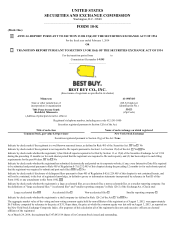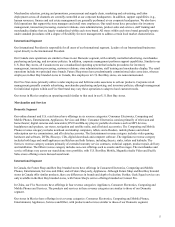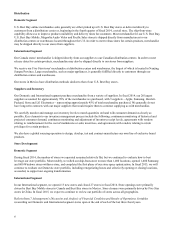Best Buy 2014 Annual Report Download - page 16
Download and view the complete annual report
Please find page 16 of the 2014 Best Buy annual report below. You can navigate through the pages in the report by either clicking on the pages listed below, or by using the keyword search tool below to find specific information within the annual report.11
Failure to effectively manage strategic ventures or acquisitions could have a negative impact on our business.
From time to time, our strategy has involved, and may in the future involve, entering into new business ventures and strategic
alliances, and making acquisitions. Assessing a potential opportunity can be based on assumptions that might not ultimately
prove to be correct. In addition, the amount of information we can obtain about a potential opportunity may be limited, and we
can give no assurance that new business ventures, strategic alliances and acquisitions will positively affect our financial
performance or will perform as planned. The success of these opportunities is also largely dependent on the current and future
participation, working relationship and strategic vision of the business venture or strategic alliance partners, which can change
following a transaction. Integrating new businesses, stores and concepts can be a difficult task. Cultural differences in some
markets into which we may expand or into which we may introduce new retail concepts may not be as well received by
customers as originally anticipated. These types of transactions may divert our capital and our management's attention from
other business issues and opportunities and may also negatively impact our return on invested capital. Further, implementing
strategic alliances or business ventures may also impair our relationships with our vendors or other strategic partners. We may
not be able to successfully assimilate or integrate companies that we acquire, including their personnel, financial systems,
distribution, operations and general operating procedures. We may also encounter challenges in achieving appropriate internal
control over financial reporting and deficiencies in information technology systems in connection with the integration of an
acquired company. If we fail to assimilate or integrate acquired companies successfully, our business, reputation and operating
results could suffer materially. Likewise, our failure to integrate and manage acquired companies successfully may lead to
impairment of the associated goodwill and intangible asset balances.
Failure to protect the integrity, security and confidentiality of our customers' data, including payment card information,
could expose us to litigation costs and materially damage our standing with our customers.
The use and handling of personally identifiable data by our business, our business associates and third parties is regulated at the
state, federal and international levels. We are also contractually obligated to comply with certain industry standards regarding
payment card information. Increasing costs associated with information security, such as increased investment in technology,
the costs of compliance and costs resulting from consumer fraud could cause our business and results of operations to suffer
materially. Additionally, the success of our online operations depends upon the secure transmission of customer and other
confidential information over public networks, including the use of cashless payments. While we take significant steps to
protect this information, lapses in our controls or the intentional or negligent actions of employees, business associates or third
parties may undermine our security measures. As a result, unauthorized parties may obtain access to our data systems and
misappropriate customer and other confidential data. There can be no assurance that advances in computer capabilities, new
discoveries in the field of cryptography or other developments will prevent the compromise of our customer transaction
processing capabilities and customer personal data. Furthermore, because the methods used to obtain unauthorized access
change frequently and may not be immediately detected, we may be unable to anticipate these methods or promptly implement
preventative measures. Any such compromise of our security or the security of information residing with our business
associates or third parties could have a material adverse effect on our reputation and may expose us to material costs, penalties
and compensation claims. In addition, any compromise of our data security may materially increase the costs we incur to
protect against such breaches and could subject us to additional legal risk.
Our reliance on key vendors subjects us to various risks and uncertainties which could affect our operating results.
We source the products we sell from a wide variety of domestic and international vendors. In fiscal 2014, our 20 largest
suppliers accounted for approximately 70% of the merchandise we purchased, with 5 suppliers – Apple, Samsung, Hewlett-
Packard, Sony and LG Electronics – representing approximately 45% of total merchandise purchased. We generally do not
have long-term written contracts with our major suppliers that would require them to continue supplying us with merchandise.
If there is a loss of or disruption in supply from any of our key vendors, if any of our key vendors fail to develop new
technologies that consumers demand or if our vendors make changes that affect the timing of when customers are able to make
purchases, our revenues and earnings may be materially adversely affected. In addition, the formation or strengthening of
business partnerships between our vendors and our competitors could limit our access to merchandise.
We have internal standards that we require all of our vendors to meet. Our ability to find qualified vendors who meet our
standards and supply products in a timely and efficient manner is a significant challenge, especially with respect to goods
sourced from outside the U.S. Political or financial instability, merchandise quality issues, product safety concerns, trade
restrictions, work stoppages, tariffs, foreign currency exchange rates, transportation capacity and costs, inflation, civil unrest,
natural disasters, outbreaks of pandemics and other factors relating to foreign trade are beyond our control. These and other
issues affecting our vendors could materially adversely affect our financial results.
























